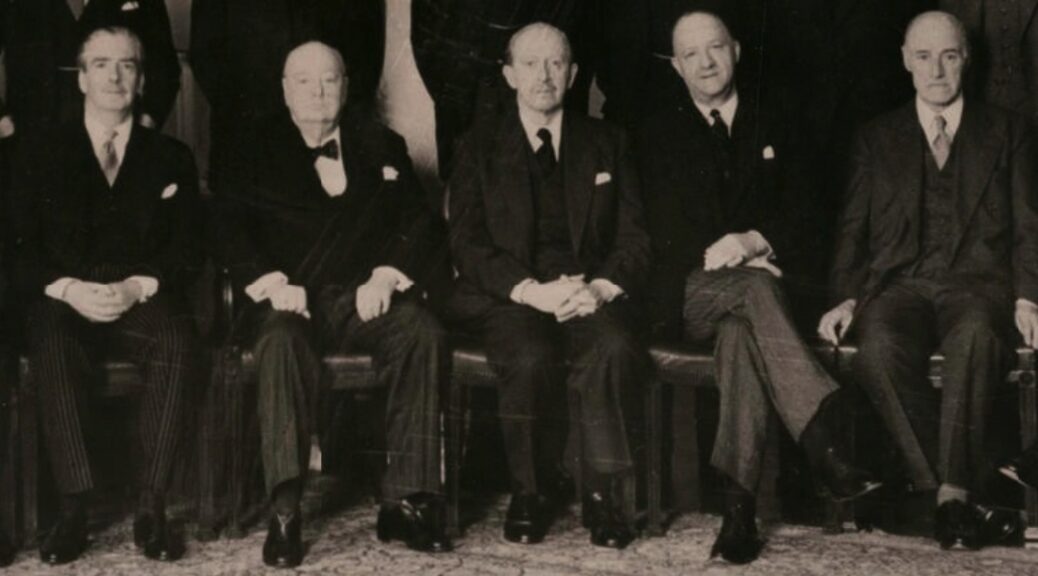
When Rab Called Churchill a “Half-Breed American”
Excerpted from “‘Half-Breed American’ and What They Meant by It,” written for the Hillsdale College Churchill Project. For the original article with endnotes, click here. To subscribe to free weekly articles from Hillsdale-Churchill, click here and scroll to bottom. Enter your email in the box “Stay in touch with us.” Your identity remains a riddle wrapped in a mystery inside an enigma.
Q: Who coined the a half-breed insult?
Didn’t one or more of Churchill’s detractors use this slur to criticize him? Google is no help. Surely you know? —S.B., Cleveland
A: Rab Butler
My colleague Michael McMenamin summarizes the answer to your question:
In his controversial book, A Republic, Not an Empire, American news commentator Pat Buchanan joined with England’s John Charmley to argue that it would have been better for Britain to make an honorable peace with Germany in 1940….
Charmley…attributes it to Churchill’s rhetorical skills and concludes with negative references to WSC’s “theatricality” [by Alexander Cadogan] and his “disorderly mind” [by Lord Halifax]. He repeats “Rab” Butler’s view of Churchill as “the greatest adventurer of modern political history,” Lord Hankey’s description of him as “a rogue elephant,” and John Colville’s memorable “half-breed American.”
“Winston and his rabble”
John Colville was quoting Richard Austin “Rab” Butler, then on the Foreign Policy Committee. He initially shared Butler’s doubts. His view on 10 May 1940 is worth quoting in full, since many elite Conservatives shared it:
7.15 PM: Alec [Douglas-Home, Lord Dunglass] and I went over to the Foreign Office to explain the position to Rab, and there, with Chips [Channon] we drank in champagne the health of “The King Over the Water” (not King Leopold, but Mr. Chamberlain).
Rab said he thought that the good clean tradition of English politics, that of Pitt as opposed to Fox, had been sold to the greatest adventurer of modern political history. He had tried earnestly and long to persuade Halifax to accept the Premiership, but he had failed.
He believed this sudden coup of Winston and his rabble was a serious disaster and an unnecessary one: the “pass had been sold” by Mr. C[hamberlain], Lord Halifax and Oliver Stanley. They had weakly surrendered to a half-breed American whose main support was that of inefficient but talkative people of a similar type, American dissidents like Lady Astor and Ronnie Tree.
A civil servant, Colville was then assigned to the new prime minister, though three days later his opinion hadn’t changed: “I spent the day in a bright blue new suit from the Fifty-Shilling Tailors, cheap and sensational looking, which I felt was appropriate to the new Government.”
Some opinion changed
Yet even then, Colville was beginning to soften. “It must be admitted,” he wrote in his diary, “that Winston’s administration, with all its faults, has drive; and men like Duff Cooper, Eden, Lord Lloyd and Herbert Morrison should be able to get things done.”
Churchill made Butler President of the Board of Education, his first cabinet-level position, on 20 July 1941—only to wax apoplectic when he found Butler had been in touch with the Swedes about a possible truce with Hitler. Historian Andrew Roberts believes it was Butler who kept Lord Halifax open to a compromise peace long after the Cabinet had backed Churchill’s determination to fight on. Yet he kept Butler on until 1945.
Churchill insiders tended to look upon Butler as an opportunist with no particular loyalties. Speaking in 1985, WSC’s last private secretary, Anthony Montague Browne, was typical. Relating Butler’s “half-breed” comment, he referred to Rab as someone “who was later to achieve great prominence in this country, but in my view no true fame.”
“The Respectable Tendency”
Michael McMenamin, in his and Curt Zoller’s seminal book on Churchill and Bourke Cockran, reflected again on Churchill’s reputation among what Andrew Roberts called “the Respectable Tendency” of the Conservative Party. The Tories who disdained Churchill were similar to those American aristocrats who disparaged Theodore Roosevelt:
Alice Roosevelt Longworth, explaining why her father disliked Churchill, takes on added significance: “Because they were so alike.” Which indeed they were: well-known writers before they were politicians, impulsive risk takers, soldiers and accomplished speakers. One was called a “cowboy” by his detractors, the other a “half-breed American.” Both eventually held their country’s highest office and each was a Nobel Prize winner—giants of their time.
“Mettle”
The historian Graham Stewart summarizes the High Tory attitude toward Churchill as he replaced Chamberlain—just in time, as it happened—in May 1940. Commenting on Butler, Dunglass and Channon drinking the health of the deposed Chamberlain, Stewart writes:
The cousin of the Duke of Marlborough, Churchill had a better claim to being aristocratic than many of those who affected to look down on him. Dunglass would inherit an earldom, but Butler was primarily wealthy because he had married into the Courtauld family, the same path that Channon—a half-breed American—had taken into the Guinness family.
So it went for a few weeks after Churchill took over. The more fair-minded among the Respectable Tendency eventually changed their minds. Some of the others never quite did. The former saw in Churchill a quality he himself cited when asked for the most important characteristic of a statesman: “Mettle.”
Related reading
“The Respectable Tendency and the New PM, 1940-2019,” 2019.
“Jibes and Insults: Churchill Took as Good as He Gave,” 2024.
“Winston Churchill on Peace with Hitler,” 2023.
“Churchill’s Consistency: ‘Politics before Country,” Part 1 of a two-part article, 2021.
“Barbara Leaming’s Churchill Defiant: Still the Best on Churchill Postwar,” 2022.







One thought on “When Rab Called Churchill a “Half-Breed American””
Leopold Maxse
June 1904: “Churchill’s attitude cannot surprise since he is himself half-alien and wholly undesirable.”
Comments are closed.